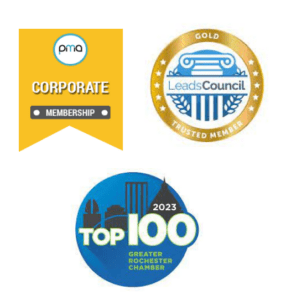Once upon a time, marketing and advertising was quite different – and much simpler. Prior to the industrial revolution, businesses relied mostly on word-of-mouth advertising and recommendations. At that time, the task of promoting products and services was not as complex (nor as demanding) as it is today. With the invention of mass-production, however, came the need for scalable marketing practices. This need, along with the rise of modern technology, gave way to a whole new era of marketing.
Today, the number of different marketing channels and techniques is almost overwhelming and can be difficult for businesses to navigate. Tasked with managing everything from print, to tv and radio ads, to digital marketing and everything in between, many businesses are choosing to outsource at least some, if not all, of their marketing practices.
Because of this, marketing and advertising has essentially become its own industry, with advertising firms, agencies and freelancers capitalizing on the marketing needs of modern businesses – in other words, charging a fee to promote the products and/or services of another business. This practice is known as affiliate marketing.
What is affiliate marketing?
In basic terms, affiliate marketing occurs when an affiliate (otherwise known as a “publisher”) earns a commission by promoting the products and/or services of an advertiser. The affiliate may be an individual, agency, network (like CallThread), or company. The affiliate’s promotion methods will vary depending on the marketing strategy and needs of the advertiser, but common methods include paid and organic search, social media marketing, content marketing, email marketing, influencer marketing and more.
Influencer marketing is one of the most popular types of affiliate marketing, in which advertisers pay individuals to promote their products or services on their personal outlets, such as blogs, social media pages, or YouTube channels. “Influencers” are usually selected by advertisers based on their, for lack of better words, influence on the advertiser’s target audience. Successful influencers have either a very large or a very specific niche fan base.
Affiliate agencies and networks, on the other hand, are typically commissioned for their knowledge of common marketing practices and promotional methods (such as SEM and SEO, email marketing, and performance-based methods), as well as their connections to external resources and publishers.
Additionally, some advertisers choose to work directly with publishers that offer sponsored listings – like TripAdvisor, Angie’s List or Yelp. This type of affiliate marketing can help advertisers get their products or services in front of the right audience. A Thai restaurant owner, for example, may want to list their restaurant on Yelp to make it more accessible to users looking for Thai food.
Why should you hire an affiliate?
There are a variety of reasons a business may choose to hire an affiliate. For starters, affiliate marketing is often cheaper and less time-consuming than hiring in-house talent. Hiring an internal marketing team requires time, training, and money, and can take time away from other responsibilities. Affiliate marketing, however, enables businesses to focus on their top business development priorities while continuing to promote their products or services.
Additionally, affiliates offer an expertise and valuable perspective into modern marketing practices and trends. Affiliates are different than most businesses in that their sole focus is on understanding the best marketing tools, techniques, and channels. Advertisers who take advantage of affiliate marketing benefit from the expert knowledge of an outside resource.
Lastly, affiliates have an expansive consumer reach that would otherwise be very expensive or take a long time to establish. Influencers, for instance, may have thousands (or even millions) of followers on social media while affiliate networks have connections with numerous external publishers and resources that can help expand an advertiser’s reach.
The rise of affiliate marketing
Over the years, affiliate marketing has grown into a booming industry. In fact, Statista projects affiliate marketing spend to reach $8.2 billion in 2022 – and that’s just in the United States. Furthermore, studies have shown that 81% of advertisers use affiliate marketing today (Forrester). Why? It makes them money while taking away the time and pressure of hiring and training in-house talent.
It would seem affiliate marketing is here to stay, as more and more businesses choose to outsource their marketing efforts. However, the best affiliate marketing strategy varies greatly from business to business based on their specific industry and business goals. One popular type of affiliate marketing is performance-based marketing.
What is performance marketing and how is it different from affiliate marketing?
Performance marketing is a form of affiliate marketing, but the two are not the same. Affiliate marketing, as mentioned above, occurs any time an affiliate is paid to promote the products and/or services of an advertiser.
Performance marketing, however, occurs when an affiliate is paid by an advertiser to generate a specific consumer action – commonly seen in the form of clicks, calls, views, impressions, or sales. For each action generated, the affiliate receives a fixed payout. In other words, the affiliate is paid specifically for ad performance. This type of affiliate marketing is a popular choice for advertisers because there is less risk involved since the advertiser only pays for the specific consumer action that is valuable to them.
Related: How to Start a Performance Marketing Program
Conclusion
Simply put, affiliate marketing is the process of hiring an external individual, agency, network, or company to promote your products or services so that you can save time and money and benefit from the expertise and expansive reach of another party. Given its benefits, affiliate marketing has grown in popularity among advertisers, and continues to grow as more and more businesses choose to outsource their marketing efforts.
Performance marketing (a type of affiliate marketing) has become particularly popular among businesses who wish to outsource some of their marketing practices while minimizing the risk of doing so. Starting a performance marketing program is a valuable way to drive measurable results from your business’s advertising spend – click here to find out how to get started.






